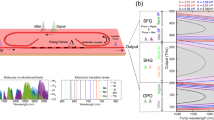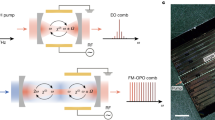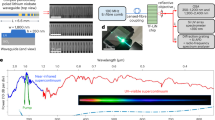Abstract
Ultra-broadband frequency combs coherently unite distant portions of the electromagnetic spectrum. They underpin discoveries in ultra-fast science and serve as the building blocks of modern photonic technologies. Despite tremendous progress in integrated sources of frequency combs, achieving multi-octave operation on chip has remained elusive mainly because of the energy demand of typical spectral broadening processes. Here we break this barrier and demonstrate multi-octave frequency comb generation using an optical parametric oscillator in nanophotonic lithium niobate with only femtojoules of pump energy. Leveraging this ultra-low threshold and dispersion engineering, we accessed a previously unexplored optical parametric oscillator regime that enables highly efficient and stable coherent spectral broadening. We achieve orders-of-magnitude reduction in the energy requirement compared with the other techniques, confirm the coherence of the comb, and present a path towards more efficient and wider spectral broadening. Our results pave the way for ultra-short-pulse and ultra-broadband on-chip nonlinear photonic systems for numerous applications.
This is a preview of subscription content, access via your institution
Access options
Access Nature and 54 other Nature Portfolio journals
Get Nature+, our best-value online-access subscription
$32.99 / 30 days
cancel any time
Subscribe to this journal
Receive 12 print issues and online access
$259.00 per year
only $21.58 per issue
Buy this article
- Purchase on SpringerLink
- Instant access to the full article PDF.
USD 39.95
Prices may be subject to local taxes which are calculated during checkout




Similar content being viewed by others
Data availability
All data are available in the Article or the Supplementary Information. The data files supporting the plots in the main text are available via figshare at https://figshare.com/s/a9e01f7ca865c5dfd390 (ref. 68).
Code availability
The code used for finding both effective index and solving the nonlinear propagation is based on the snow library available via GitHub at https://github.com/ledezmaluism/snow (ref. 69). Any further computer code used in this paper is available from the corresponding author upon reasonable request.
References
Carlson, D. R. et al. Ultrafast electro-optic light with subcycle control. Science 361, 1358–1363 (2018).
Diddams, S. A., Vahala, K. & Udem, T. Optical frequency combs: coherently uniting the electromagnetic spectrum. Science 369, eaay3676 (2020).
Kippenberg, T. J., Gaeta, A. L., Lipson, M. & Gorodetsky, M. L. Dissipative Kerr solitons in optical microresonators. Science 361, eaan8083 (2018).
Chang, L., Liu, S. & Bowers, J. E. Integrated optical frequency comb technologies. Nat. Photon. 16, 95–108 (2022).
Gaeta, A. L., Lipson, M. & Kippenberg, T. J. Photonic-chip-based frequency combs. Nat. Photon. 13, 158–169 (2019).
Suh, M.-G., Yang, Q.-F., Yang, K. Y., Yi, X. & Vahala, K. J. Microresonator soliton dual-comb spectroscopy. Science 354, 600–603 (2016).
Marin-Palomo, P. et al. Microresonator-based solitons for massively parallel coherent optical communications. Nature 546, 274–279 (2017).
Spencer, D. T. et al. An optical-frequency synthesizer using integrated photonics. Nature 557, 81–85 (2018).
Tran, M. A. et al. Extending the spectrum of fully integrated photonics to submicrometre wavelengths. Nature 610, 54–60 (2022).
Riemensberger, J. et al. Massively parallel coherent laser ranging using a soliton microcomb. Nature 581, 164–170 (2020).
Lesko, D. M. B. et al. A six-octave optical frequency comb from a scalable few-cycle erbium fibre laser. Nat. Photon. 15, 281–286 (2021).
Elu, U. et al. Seven-octave high-brightness and carrier-envelope-phase-stable light source. Nat. Photon. 15, 277–280 (2021).
Wirth, A. et al. Synthesized light transients. Science 334, 195–200 (2011).
Corkum, P. B. & Krausz, F. Attosecond science. Nat. Phys. 3, 381–387 (2007).
Muraviev, A. V., Smolski, V. O., Loparo, Z. E. & Vodopyanov, K. L. Massively parallel sensing of trace molecules and their isotopologues with broadband subharmonic mid-infrared frequency combs. Nat. Photon. 12, 209–214 (2018).
Picqué, N. & Hänsch, T. W. Frequency comb spectroscopy. Nat. Photon. 13, 146–157 (2019).
Chang, C.-I. Hyperspectral Imaging (Springer, 2003).
Yu, M. et al. Integrated femtosecond pulse generator on thin-film lithium niobate. Nature 612, 252–258 (2022).
Guo, Q. et al. Ultrafast mode-locked laser in nanophotonic lithium niobate. Science 382, 708–713 (2023).
Stern, B., Ji, X., Okawachi, Y., Gaeta, A. L. & Lipson, M. Battery-operated integrated frequency comb generator. Nature 562, 401–405 (2018).
Pfeiffer, M. H. P. et al. Octave-spanning dissipative Kerr soliton frequency combs in Si3N4 microresonators. Optica 4, 684–691 (2017).
Li, Q. et al. Stably accessing octave-spanning microresonator frequency combs in the soliton regime. Optica 4, 193–203 (2017).
Obrzud, E. et al. A microphotonic astrocomb. Nat. Photon. 13, 31–35 (2019).
Wu, T.-H. et al. Visible-to-ultraviolet frequency comb generation in lithium niobate nanophotonic waveguides. Nat. Photon. 18, 218–223 (2024).
Oh, D. Y. et al. Coherent ultra-violet to near-infrared generation in silica ridge waveguides. Nat. Commun. 8, 13922 (2017).
Ludwig, M. et al. Ultraviolet astronomical spectrograph calibration with laser frequency combs from nanophotonic lithium niobate waveguides. Nat. Commun. 15, 7614 (2024).
Dudley, J. M., Genty, G. & Coen, S. Supercontinuum generation in photonic crystal fiber. Rev. Mod. Phys. 78, 1135–1184 (2006).
Vasilyev, S. et al. Multi-octave visible to long-wave IR femtosecond continuum generated in Cr:ZnS-GaSe tandem. Opt. Express 27, 16405–16412 (2019).
Jankowski, M. et al. Ultrabroadband nonlinear optics in nanophotonic periodically poled lithium niobate waveguides. Optica 7, 40–46 (2020).
Anderson, M. H. et al. Photonic chip-based resonant supercontinuum via pulse-driven Kerr microresonator solitons. Optica 8, 771–779 (2021).
Anderson, M. H. et al. Zero dispersion Kerr solitons in optical microresonators. Nat. Commun. 13, 4764 (2022).
Molesky, S. et al. Inverse design in nanophotonics. Nat. Photon. 12, 659–670 (2018).
McMahon, P. L. et al. A fully programmable 100-spin coherent Ising machine with all-to-all connections. Science 354, 614–617 (2016).
Marandi, A., Leindecker, N. C., Pervak, V., Byer, R. L. & Vodopyanov, K. L. Coherence properties of a broadband femtosecond mid-IR optical parametric oscillator operating at degeneracy. Opt. Express 20, 7255–7262 (2012).
Marandi, A., Ingold, K. A., Jankowski, M. & Byer, R. L. Cascaded half-harmonic generation of femtosecond frequency combs in the mid-infrared. Optica 3, 324–327 (2016).
Sun, J. H., Gale, B. J. S. & Reid, D. T. Composite frequency comb spanning 0.4–2.4 μm from a phase-controlled femtosecond Ti:sapphire laser and synchronously pumped optical parametric oscillator. Opt. Lett. 32, 1414–1416 (2007).
Roy, A. et al. Temporal walk-off induced dissipative quadratic solitons. Nat. Photon. 16, 162–168 (2022).
Ledezma, L. et al. Intense optical parametric amplification in dispersion-engineered nanophotonic lithium niobate waveguides. Optica 9, 303–308 (2022).
Roy, A. et al. Visible-to-mid-IR tunable frequency comb in nanophotonics. Nat. Commun. 14, 6549 (2023).
Ledezma, L. et al. Octave-spanning tunable infrared parametric oscillators in nanophotonics. Sci. Adv. 9, eadf9711 (2023).
Hamerly, R. et al. Reduced models and design principles for half-harmonic generation in synchronously pumped optical parametric oscillators. Phys. Rev. A 94, 063809 (2016).
Ning, C., Feng, X., Heng, J. & Zhang, Z. Supercontinuum generation from a quasi-stationary doubly resonant optical parametric oscillator. Opt. Lett. 46, 4280–4283 (2021).
Suret, P., Lefranc, M., Derozier, D., Zemmouri, J. & Bielawski, S. Fast oscillations in an optical parametric oscillator. Opt. Commun. 200, 369–379 (2001).
Leidinger, M. et al. Comparative study on three highly sensitive absorption measurement techniques characterizing lithium niobate over its entire transparent spectral range. Opt. Express 23, 21690–21705 (2015).
Okawachi, Y. et al. Chip-based self-referencing using integrated lithium niobate waveguides. Optica 7, 702–707 (2020).
Yu, M., Desiatov, B., Okawachi, Y., Gaeta, A. L. & Lončar, M. Coherent two-octave-spanning supercontinuum generation in lithium-niobate waveguides. Opt. Lett. 44, 1222–1225 (2019).
Carlson, D. R. et al. Photonic-chip supercontinuum with tailored spectra for counting optical frequencies. Phys. Rev. Appl. 8, 014027 (2017).
Spaun, B. et al. Continuous probing of cold complex molecules with infrared frequency comb spectroscopy. Nature 533, 517–520 (2016).
Bjork, B. J. et al. Direct frequency comb measurement of OD + CO → DOCO kinetics. Science 354, 444–448 (2016).
Weng, W. et al. Gain-switched semiconductor laser driven soliton microcombs. Nat. Commun. 12, 1425 (2021).
Xu, Y. et al. Harmonic and rational harmonic driving of microresonator soliton frequency combs. Optica 7, 940–946 (2020).
Obrzud, E., Lecomte, S. & Herr, T. Temporal solitons in microresonators driven by optical pulses. Nat. Photon. 11, 600–607 (2017).
Inagaki, T. et al. Large-scale Ising spin network based on degenerate optical parametric oscillators. Nat. Photon. 10, 415–419 (2016).
Devgan, P.S. et al. 10-GHz dispersion-managed soliton fiber-optical parametric oscillator using regenerative mode-locking.Opt. Lett. 30, 528–530 (2005). erratum 30, 1743. (2005).
Roy, A., Nehra, R., Langrock, C., Fejer, M. & Marandi, A. Non-equilibrium spectral phase transitions in coupled nonlinear optical resonators. Nat. Phys. 19, 427–434 (2023).
Ingold, K. A., Marandi, A., Digonnet, M. J. F. & Byer, R. L. Fiber-feedback optical parametric oscillator for half-harmonic generation of sub-100-fs frequency combs around 2 μm. Opt. Lett. 40, 4368–4371 (2015).
Langrock, C. & Fejer, M. M. Fiber-feedback continuous-wave and synchronously-pumped singly-resonant ring optical parametric oscillators using reverse-proton-exchanged periodically-poled lithium niobate waveguides. Opt. Lett. 32, 2263–2265 (2007).
Sharping, J. E., Fiorentino, M., Kumar, P. & Windeler, R. S. Optical parametric oscillator based on four-wave mixing in microstructure fiber. Opt. Lett. 27, 1675–1677 (2002).
Deng, Y., Lin, Q., Lu, F., Agrawal, G. P. & Knox, W. H. Broadly tunable femtosecond parametric oscillator using a photonic crystal fiber. Opt. Lett. 30, 1234–1236 (2005).
Sharping, J. E. et al. Octave-spanning, high-power microstructure-fiber-based optical parametric oscillators. Opt. Express 15, 1474–1479 (2007).
Gao, M., Lüpken, N. M., Boller, K.-J. & Fallnich, C. Optical parametric oscillator based on silicon nitride waveguides. In Optica Advanced Photonics Congress 2022, Technical Digest Series JTh4A.3 (Optica Publishing Group, 2022).
Marandi, A., Wang, Z., Takata, K., Byer, R. L. & Yamamoto, Y. Network of time-multiplexed optical parametric oscillators as a coherent Ising machine. Nat. Photon. 8, 937–942 (2014).
Heckl, O. H. et al. Three-photon absorption in optical parametric oscillators based on OP-GaAs. Opt. Lett. 41, 5405–5408 (2016).
Reid, D. T., Kennedy, G. T., Miller, A., Sibbett, W. & Ebrahimzadeh, M. Widely tunable, near- to mid-infrared femtosecond and picosecond optical parametric oscillators using periodically poled LiNbO3 and RbTiOAsO4. IEEE J. Sel. Topics Quantum Electron. 4, 238–248 (1998).
Sekine, R., Gray, R., Ledezma, L., Guo, Q. & Marandi, A. Sync-pumped femtosecond OPO based on dispersion-engineered nanophotonic PPLN with 3-octave spectrum. In Conference on Lasers and Electro-Optics (CLEO) 2022 SM5K.2 (Optica Publishing Group, 2022).
Li, J. et al. Efficiency of pulse pumped soliton microcombs. Optica 9, 231–239 (2022).
Burr, K. C., Tang, C. L., Arbore, M. A. & Fejer, M. M. Broadly tunable mid-infrared femtosecond optical parametric oscillator using all-solid-state-pumped periodically poled lithium niobate. Opt. Lett. 22, 1458–1460 (1997).
Sekine, R. Multi-octave frequency comb from an ultra-low-threshold nanophotonic parametric oscillator. figshare https://figshare.com/s/a9e01f7ca865c5dfd390 (2025).
Ledezma, L. snow: Simulator for nonlinear optical waveguides. GitHub https://github.com/ledezmaluism/snow (2025).
Acknowledgements
The device nanofabrication was performed at the Kavli Nanoscience Institute (KNI) at Caltech. We thank M. Bagheri for loaning equipment. We gratefully acknowledge support from ARO grant number W911NF-23-1-0048, NSF grant numbers 1846273, 1918549 and 2408297, AFOSR award number FA9550-23-1-0755, DARPA award number D23AP00158, the Center for Sensing to Intelligence at Caltech, and NASA/JPL. We wish to thank NTT Research for their financial support.
Author information
Authors and Affiliations
Contributions
R.S. and A.M. conceived the project. R.S. fabricated the devices with assistance from L.L., S.Z. and Q.G. R.M.G. and R.S. performed the measurements and R.M.G. carried out the simulations with initial input from L.L. R.S. and A.M. wrote the manuscript with inputs from all authors. A.M. supervised the project.
Corresponding author
Ethics declarations
Competing interests
L.L. and A.M. are inventors on granted US patent 11,226,538 that covers thin-film optical parametric oscillators. R.S., R.M.G., L.L., A. Roy and A.M. are inventors on a US provisional patent application filed by the California Institute of Technology (application number 63/466,188). R.M.G., L.L. and A.M. are inventors on a US provisional patent application filed by the California Institute of Technology (application number 63/434,015) on 20 December 2022. R.S., L.L. and A.M. are involved in developing photonic integrated nonlinear circuits at PINC Technologies Inc. R.S., L.L. and A.M. have an equity interest in PINC Technologies Inc. The other authors declare no competing interests.
Peer review
Peer review information
Nature Photonics thanks Jens Biegert and the other, anonymous, reviewer(s) for their contribution to the peer review of this work.
Additional information
Publisher’s note Springer Nature remains neutral with regard to jurisdictional claims in published maps and institutional affiliations.
Supplementary information
Supplementary Information
Supplementary Sections I–IV, Figs. 1–24 and Discussion.
Rights and permissions
Springer Nature or its licensor (e.g. a society or other partner) holds exclusive rights to this article under a publishing agreement with the author(s) or other rightsholder(s); author self-archiving of the accepted manuscript version of this article is solely governed by the terms of such publishing agreement and applicable law.
About this article
Cite this article
Sekine, R., Gray, R.M., Ledezma, L. et al. Multi-octave frequency comb from an ultra-low-threshold nanophotonic parametric oscillator. Nat. Photon. 19, 1189–1195 (2025). https://doi.org/10.1038/s41566-025-01753-7
Received:
Accepted:
Published:
Version of record:
Issue date:
DOI: https://doi.org/10.1038/s41566-025-01753-7
This article is cited by
-
Multi-octave frequency comb from an ultra-low-threshold nanophotonic parametric oscillator
Nature Photonics (2025)



